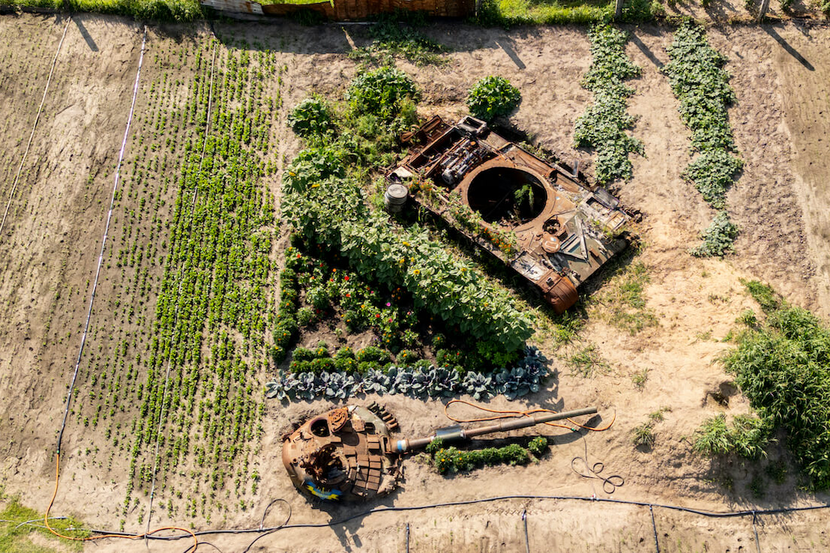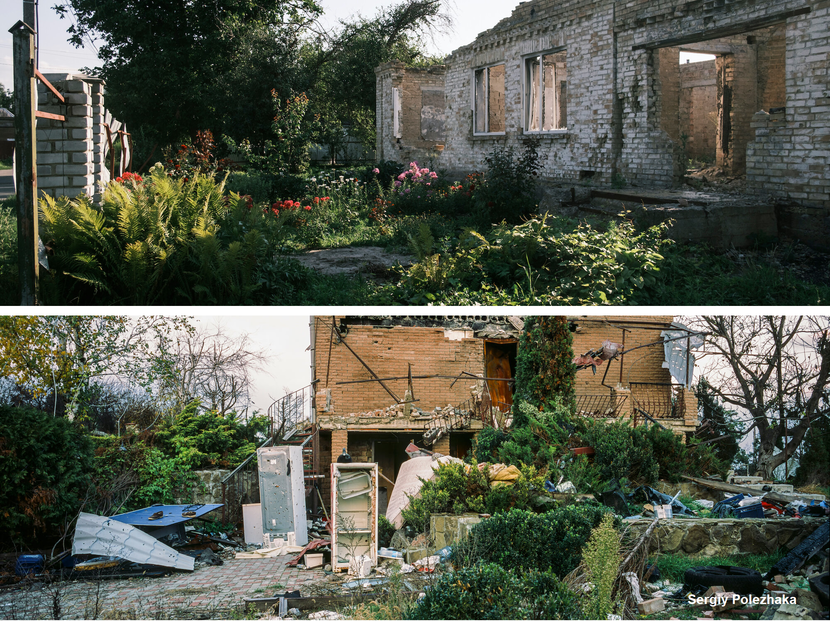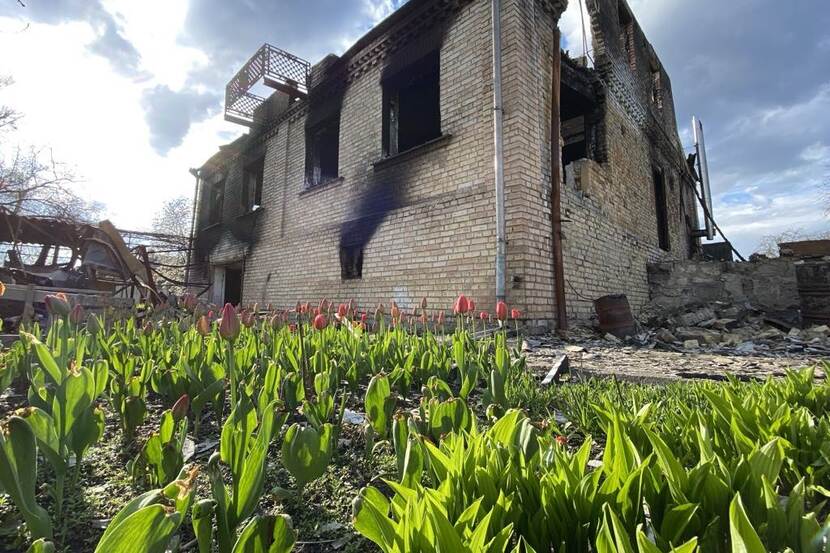Naïve Gardens: what the land means for Ukrainans
Why Ukrainians keep tending their gardens while everything is on fire. This documentary of Sergiy Polezhaka and the article of "The Ukrainians" explain to foreigners what the land means to Ukrainian people.

Source: Naïve Gardens – Reporters by Dasha B, Serhii Polezhaka. Translation — Marta Gosovska
Documentary photographer Sergiy Polezhaka has been capturing the war since 2014, but what still amazes him is how fiercely people cling to their frontline gardens, flowerbeds, and orchards. Along the line of fire, he meets people who water roses beneath the ruins of their homes, clear mines from their fields so they can graze cattle, and decorate garden rockeries with fragments of Russian shells.
They do this without waiting for a ceasefire: under fire, under occupation, in villages that have been wiped out. When they evacuate, they take bundles of seedlings with them, and for a long time, they lament that the climate in Poltava or Cherkasy is not the same as in their native Izyum or Donbas, as if they’ve moved thousands of kilometers away from home.
Sergiy’s “Naïve Gardens” project was born from his thoughts on how to explain to a foreigner what the land means to a Ukrainian, literally, the soil that grows apple trees and cucumbers.

“I first started photographing gardens and how people interact with their space when I went to Irpin and Bucha on the anniversary of their liberation. An Italian journalist and I were traveling together, talking about the war, and he was genuinely surprised that people didn’t leave their homes. He said, ‘I wouldn’t fight; I’d go somewhere else, and no one could make me fight for territory.
I wanted to explain our context through a paradox. On one hand, we have a lot of land, and it’s very fertile. But at the same time, we’ve constantly been threatened with losing it: first serfdom, then collectivization, and now this great war. You live and work hard on the land that feeds you, but there’s always a risk of losing it.”
“I think this is why we’re so reluctant to become refugees, why we’re so determined to stay and defend what we have. People don’t want to lose what they’ve invested their lives in. They don’t want to wander around Europe or the rest of the world. Now that they finally own this land and work it to sustain themselves, a stubbornness takes hold. I saw it in a village in the Kyiv region, where a woman was carefully tending colorful flowerbeds against the backdrop of the charred ruins that were once her home. On the other side of the house was a plowed field, clearly waiting to be sown. This is also about naivety: people often keep doing what they’ve always done simply because they’re used to it, because they don’t know any other way to live.”
“In Northern Saltivka, the district of Kharkiv that has suffered the most from Russian shelling, I met a woman who returned home after months of evacuation. She laughed at herself, saying she must be out of her mind, because the first thing she did when she got back was run to the three apple trees she and her neighbors had planted by her driveway. She hugged them and cried.”
“So, this story isn’t just about gardens or even about Ukrainians. It’s about a sense of home. It’s about putting so much effort into something and seeing the fruits of your labor endure, they waited for you.”
“I also wonder how the Ukrainian village will change after the war. Fence-sitting might no longer be relevant. I wonder if we’ll continue to fence ourselves off from our neighbors with high walls, considering how people helped each other after shelling, watched over abandoned houses to prevent looting. After all, it’s clear now that a fence won’t protect us from the real threat, a cruel, big neighbor from the north.
People paint flowers around shrapnel holes in their fences and decorate mines (hopefully defused) because they need to. It’s their way of saying ‘fuck you’ to the war. They tell it, ‘You have no power over me. Now, you’re just part of my decor.'”
[The translation of this publication was compiled with the support of the European Union and the International Renaissance Foundation within the framework “European Renaissance of Ukraine” project. Its content is the exclusive responsibility of the authors and does not necessarily reflect the views of the European Union and the International Renaissance Foundation]

Love for the land is embedded in the DNA of Ukrainians. From early age, Ukrainians learn to work on their land and appreciate everything that is grown with their own hands. Even during strict quarantine, Ukrainians went uncontrollably to their countryside gardens, to the villages where their parents and relatives live, to plant, sow and harvest. With the full-scale invasion, the residents of the cities often found safe places in the villages. There the cellars are usually full of fruit, vegetables and home-made delicious food preserved or winter. These cellars rescued people in the occupation and provided for internally displaced people across the country.
Every spring, regardless of the challenges and threats, Ukrainians: people from villages and cities, businessmen, workers of various industries, representatives of civil society, public and private sectors go to the countryside to plant their kitchen gardens. This is a tradition, but often a necessity, this is also a deep respect for older generations, and a moment of unity with the native land.
The New Yorker : Two Weeks at the Front in Ukraine
“The soldiers of the 28th Brigade, many of whom came from rural areas, shared a concept of Ukrainian land that was strikingly literal. In the trenches, several infantrymen had nodded at the dark-brown walls surrounding us, which were marbled with pale, healthy roots, and asked me if the soil in the United States was as rich and arable as theirs.
The fact that this same soil now shielded them against injury and death had only deepened their attachment to it. They had become a species that burrowed to elude predation. On the Zero Line, there was only enough water for drinking, not for washing, and the men’s cracked fingernails and thickly calloused palms were so encrusted with dirt that it seemed to have become part of them.
At sunset, at the red brick house, a soldier was in the yard, making troughs with a shovel and sowing them with pea seeds. “This is what we’re fighting for,” he said, his sleeves pushed to his elbows. “This land is dear to us.” He was a forty-seven-year-old construction worker whose job was to extend the range of the B.R.M.’s rockets by disassembling them with a monkey wrench and removing a component that caused them to detonate after a certain distance. In his spare time, he tended the vegetable patch, which he hoped would be sprouting when the homeowners returned.”